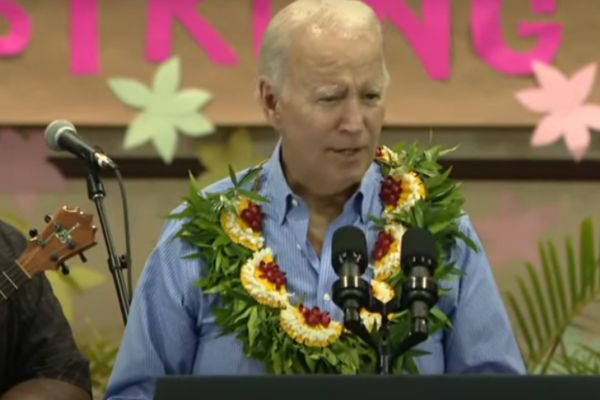
- Details
- By Kaili Berg
President Joe Biden traveled to Maui, Hawai‘i on Monday, two weeks after deadly wildfires broke out across multiple islands, destroying countless structures and killing more than 100 people.
“The American people stand with you,” he said, according to a statement from the White House, to survivors of the wildfire, standing alongside Democratic Hawai‘i Governor Josh Green, Maui Mayor Richard Bissen, and the Hawaii Congressional Delegation. “For as long as it takes, we’re going to be with you.”
Biden pointed to his left, where stood a 150-year-old banyan tree, which was there in the former capital of the Kingdom of Hawai‘i, that has stood for generations as a sacred spot of exceptional significance.
“Today, it’s burned, but it’s still standing. The tree survived for a reason. I believe it’s a powerful symbol of what we can and will do to get through this crisis. And for as long as it takes, we're going to be with you, the whole country will be with you,” Biden said.
“We will be respectful of these sacred grounds and the traditions that rebuild the way the people of Maui want to build, not the way others want to build.”
But the Star-Advertiser warned Biden before he came to Maui that “a warm welcome may not be assured for Biden in some circles on Maui,” because of frustrations from survivors over applying for federal FEMA aid — many lost the government ID’s and paperwork FEMA requires for aid to the flames.
State Sen. Jarrett Keohokalole (D) who co-chairs the Legislature’s Native Hawaiian Caucus, told the Star-Advertiser that the failure of the state Department of Hawaiian Home Lands “to fulfill its obligation to build homes for the remaining 28,700 Native Hawaiians on the wait list” along with an apparent “lack of meaningful action since then-President Bill Clinton signed legislation in 1993 apologizing for the illegal overthrow of the Hawaiian Kingdom 100 years earlier,” both contribute to efforts on social media discouraging Native Hawaiians from applying for much-needed aid. “They’re trying to tap into that anger and frustration and stress,” he added.
Here’s what people in Hawai‘i are saying about Biden's recent trip to Maui:
Lynwood Hale: Mahalo Akua for an Empathetic President.
Kalani Santana: Please President….Keep your words and continue to help as much as you can! Mahalo.
Luka Kahele: Keep Lahaina lands in lahaina’s hands.
Punawai: Mahalo President for coming to Maui.
Mapuana Lee: People of Lahaina do not sell your property. Your land is worth more than your house. You will get to rebuild. I believe President Biden is good on his words.
Robert Yokoyama: There is so much cynicism and negativity in politics. I just hope he is sincere in his promise to Maui.
Komaki Masaaki Alahuapo’o: “Nobody wants to get sick from the compromised water supply filled to the brim with pfas forever chemicals.” He really doesn't have a clue at all.
Biden acknowledged the long road ahead for the island but reiterated that the federal government will continue to assist in recovery, sheltering, and rebuilding efforts for a long time.
More Stories Like This
Southern Sierra Miwuk Nation Gets 900-Acres ofLand BackChilkat Indian Village Tells New Palmer Mine Owners They Are “Not Welcome” in Chilkat Valley
Tribes, Coastal Group Ask Army Corps to Revoke Permit for Texas Export Terminal
Michigan Tribes Tell Supreme Court: Don’t Bail Out Enbridge
Alaskans Raise More Than $1 Million For Communities Devastated by Typhoon Halong
Help us defend tribal sovereignty.
At Native News Online, our mission is rooted in telling the stories that strengthen sovereignty and uplift Indigenous voices — not just at year’s end, but every single day.
Because of your generosity last year, we were able to keep our reporters on the ground in tribal communities, at national gatherings and in the halls of Congress — covering the issues that matter most to Indian Country: sovereignty, culture, education, health and economic opportunity.
That support sustained us through a tough year in 2025. Now, as we look to the year ahead, we need your help right now to ensure warrior journalism remains strong — reporting that defends tribal sovereignty, amplifies Native truth, and holds power accountable.
 The stakes couldn't be higher. Your support keeps Native voices heard, Native stories told and Native sovereignty defended.
The stakes couldn't be higher. Your support keeps Native voices heard, Native stories told and Native sovereignty defended.
Stand with Warrior Journalism today.
Levi Rickert (Potawatomi), Editor & Publisher


